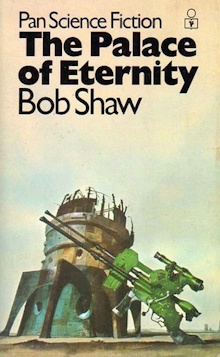This is one of the vintage science-fiction books I’ve been dipping into from time to time, one of the recommendations I got from YouTube. I found it notable in that it can be sharply divided into two parts which are very different from one another. I’d characterize the first part as a fairly stereotypical military SF story of the era that feels like it’s working towards the protagonist becoming an action hero. But then partway through he gets killed and then things get really crazy. Unfortunately I didn’t really like either part and I disliked the low-key sexism throughout. The best thing that I can say is that it’s a short book and so was easy to get through.
In the far future, humans have spread across the galaxy on butterfly ships that scoop up interstellar hydrogen to use as reaction mass. But their expansion is checked by a hostile alien civilization, the Pythsyccans, who slaughter every human they encounter, down to the last woman and child, and resist every attempt at communication. Tavernor Mack is a former military officer who has spent his life fighting the aliens since his family was massacred by them when he was a child. Now he is retired on the remote planet of Mnemosyne which is seen as an enclave for artists to get away from the war. One night he is visited by Lissa, the beautiful daughter of the planet’s governor. He has a crush on Lissa and suspects that she likes him too but refrains from doing anything as she is so much younger than him. She lures him out of his cabin in the woods and the next thing he knows the entire forest has been glassed and military forces arrive on the planet. He realizes that humanity is losing the war and Mnemosyne has become the new frontline. A hotshot military officer, the nephew of the president of Earth’s Federation arrives to take charge and immediately attempts to woo Lissa. Tavernor is incensed by the violence by which he quells the protests by the civilian population and joins the rebels.
That’s only the very earliest part of Tavernor’s story however. Given how short this book is, it’s astonishing how much plot Bob Shaw manages to fit in as Tavernor is later killed, learns the true nature of the war against the Pythsyccans, and is given a chance to be reborn. I found the first part to be a fairly standard military action story with flashback scenes of Tavernor being the sole survivor of an alien attack and later fighting back against the military as a rebel, but I have to admit it is a rollicking good read. Then it veers off to become something else but it’s still in keeping with the New Wave, post-Vietnam War vibes of the era and there are plentiful hints of it sprinkled throughout. This is a setting in which telepathy exists and all life in the universe is interconnected on a primal level. Tavernor may have been a highly decorated soldier but he has become thoroughly jaded, both by how the military treats civilians as the enemy and by how his personal trauma has been used for propaganda purposes. In the middle of it, the fact that Lissa’s sister, the 3-year old Bertha seems intelligent beyond her years and has strange healing powers, almost makes sense.
The premise immediately ticked off several pet peeves for me: a middle-aged weary war hero romantically entangled with a gorgeous girl half his age, he’s horny for her but shows restraint because of his personal integrity and the age gap, he’s super competent and skilled in combat despite his age and has even designed a weapon that the military still uses, the list goes on. But really annoyed me however is that the novel shows that Lissa really does love him without giving any reason for it. Worst of all however is that there are some really skeevy scenes involving Bertha. In her first appearance, she uses her mysterious healing power on Tavernor by placing her hand on his groin. Later things get even weirder though I won’t spoil the details here. Even though nothing is overtly sexual, there are still instances of women being unnecessarily naked in front of Tavernor. Maybe it’s the hippy, New Age vibes of the era so there’s a lot of faff about everything being connected through a world mind. The story effectively sets up a sci-fi rationale for the existence of immortal souls and it’s not, but it’s not fantastically original either. Some readers have compared it to Arthur C. Clarke’s Childhood’s End, except Clarke’s book is a grander vision without the baggage of it being also a male fantasy.
The book does move along at a good clip and has decent prose. But that’s not enough to make up for the sexism and how blatantly it is a male fantasy. Some ideas in it are neat, maybe, but it doesn’t even commit fully to its vision. For some reason, even after death the human world mind is still distinct from the Pythsyccan world mind. Not everyone is one big happy family after all.
